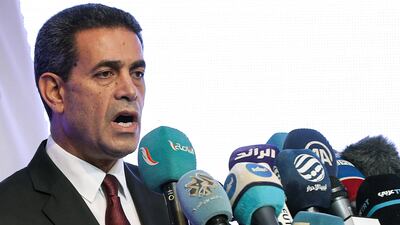The US is working with Libya’s High National Election Commission to secure the North African country’s electoral infrastructure before Libyans head to the polls this month.
Megan Doherty, who oversees Middle East and North Africa operations for the US Agency for International Development (USAID), told Congress on Thursday that her agency is co-ordinating with the commission on “all aspects of the electoral process from voter registration and identification cards to cybersecurity".
“USAID has also equipped [High National Election Commission] field offices across the country, trained judges and lawyers on electoral dispute resolution and worked with the Ministry of Interior on risk mitigation and incident planning,” Ms Doherty told the House of Representatives.
“To counter a dangerous uptick in electoral misinformation and hate speech, USAID helped [the commission] set up voter information hotlines and supported civil society organisations to create fact-checking websites to ensure Libyans have access to credible, timely information to combat rumours in real time.”
She added that “USAID is also working with television and radio stations, newspapers and social media platforms to secure their agreement to a code of conduct preventing hate speech and promoting unbiased coverage".
Ms Doherty noted that the US has also helped establish a joint elections security operations centre while helping Libyan election committee officials create an election violence monitoring dashboard “to provide early warning of potential violence and to help them respond".
USAID is also engaged in anti-violence public awareness campaigns in the final weeks before the election.
Libyans are scheduled to head to the polls for the first round of presidential elections on December 24. The second round, to be held alongside parliamentary elections, are scheduled for February.
The elections were agreed to after Libya’s warring parties, based out of Tripoli and Tobruk, respectively, agreed to a ceasefire last year.
About 100 candidates have registered to run in the presidential elections, including Field Marshal Khalifa Haftar, who until recently commanded forces allied with the Tobruk-based government.
Despite calls from some parties to delay elections, US officials indicated they expected the vote to proceed later this month even as Libya scrambles to develop the necessary electoral infrastructure.
“If there's any kind of a delay in the elections, it's going to be because of technical issues,” said Karen Sasahara, deputy assistant secretary of state for North Africa.
“People want to make sure that everything is in place, that people have their voter registration cards, that they know where they're supposed to show up and that there is real security and integrity in terms of securing the ballot boxes and accounting.”
Ms Doherty noted that USAID would support Libyan authorities if they deem an election delay necessary and vowed to “work with them to address whatever the technical issues that they identify are".
In the meantime, Libyans continue to register to vote, which Ms Sasahara called a “very strong signal".
“The political elites are finally realising that the Libyan people are going to hold them to an account,” she said.
“Even through all of the doubt, all of the debate, all of the shenanigans, Libyans — millions of them — continue to register.”










